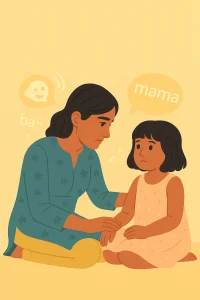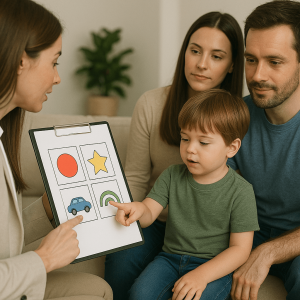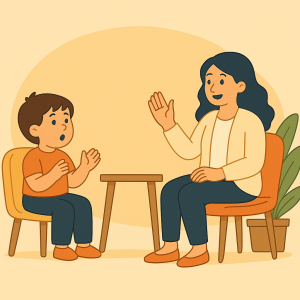Important Signs Your Marriage Could Benefit from Counseling
By Prapoorna M
Last Updated: May 8, 2024
When you hear the phrase marriage counseling, what comes to mind? For many, there’s a swift jump to the conclusion that it signals deep trouble or a last resort to salvage a failing relationship. However, this common misconception couldn’t be further from the truth. Marriage counseling is not just a service for struggling couples; it’s a proactive tool that can benefit marriages at various stages, helping partners strengthen their bonds and resolve conflicts before they become insurmountable.
Think of it this way: just like regular maintenance keeps your car running smoothly, regular check-ins through counseling can keep your relationship healthy and vibrant.
It’s about understanding each other better, sharpening communication skills, and navigating life’s challenges together in more effective ways.
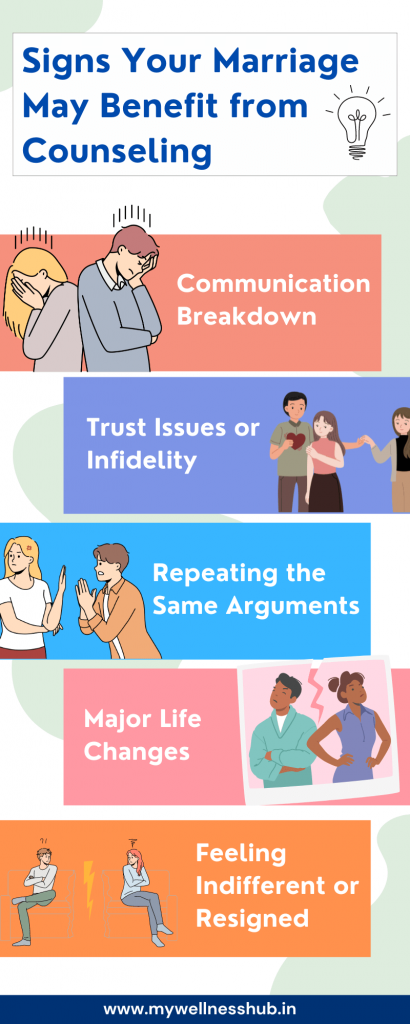
You’re More Like Roommates Than a Married Couple
Have you ever felt like you and your spouse are just sharing a living space rather than building a life together? If conversations have dwindled to mundane exchanges about chores and schedules, and if the end of the day finds you both retreating to separate corners instead of sharing quality time, it might indicate that emotional and physical intimacy has waned. This scenario is more common than you might think and can be a subtle sign that your relationship could benefit from professional guidance.
Imagine this: It’s another evening at home. You’re in one room watching your favorite show, and your partner is in another, absorbed in a book. The silence between you isn’t filled with a comfortable peace but a growing distance that neither of you may have intended to create. Meals are eaten at different times, conversations about personal feelings or dreams seem like a distant memory, and you start to feel more like roommates than the loving partners you once were.
Repeating the Same Arguments
Do you find yourself in a loop of the same disagreements with your spouse? Whether it’s about finances, household responsibilities, or parenting styles, revisiting the same issues repeatedly without resolution can signal a deeper problem in communication and conflict resolution strategies within your marriage. This repetitive cycle not only drains emotional energy but also prevents you from moving forward and addressing underlying issues effectively.
Marriage counseling offers a constructive platform to break out of this frustrating loop. A qualified counselor can help you both understand the root causes of your recurring conflicts. Perhaps it’s not just about the monthly budget or who takes out the trash. Maybe these repeated arguments stem from deeper unmet needs or unresolved feelings that haven’t been adequately expressed.
Communication Breakdown
Have you ever felt like you’re speaking a different language than your partner, even though you’re both speaking English? Signs of communication breakdown in a relationship can include avoiding discussions about important topics, feeling unheard or misunderstood, and having frequent misunderstandings. These issues can create a significant barrier to a healthy relationship, leading to frustration and resentment over time.
A common sign is avoiding conversations. This might look like changing the subject when a sensitive topic comes up or using distractions like technology to escape dealing with the issue. Feeling unheard is another critical sign; this happens when you express your thoughts and feelings but don’t feel acknowledged or understood by your partner. Lastly, frequent misunderstandings can indicate that both of you might not be truly listening to each other or are interpreting words and actions differently than intended.
Trust Issues or Infidelity
When trust is broken in a marriage, it can feel like the whole relationship is cracked. Betrayal, whether from emotional cheating, a physical affair, or repeated lies, can cause a lot of pain, anger, and confusion. Both partners might feel disconnected and unsure if the marriage can be saved.
However, it’s important to remember that while infidelity is a significant challenge, it doesn’t always signify the end of a marriage. With the right support and commitment, it is possible to move past this hurdle. This is where marriage counseling can play a crucial role. A skilled counselor can provide a safe, neutral space for both partners to express their feelings, understand the factors that led to the betrayal, and start the healing process.
Major Life Changes
Life doesn’t stand still, and neither does marriage. External pressures like financial strain, job loss, or major life transitions such as moving to a new city or having a baby can test the strongest of unions. These changes can strain your relationship, creating stress and conflict as you both attempt to navigate through these uncharted waters. Often, it’s not the change itself but how each partner reacts to it that can either fortify or weaken the bond.
Marriage counseling can be a valuable tool in these times. It provides a structured space where both partners can express their concerns and fears without judgment. A counselor can help you both understand each other’s perspectives better and develop strategies to manage stress effectively. This could involve setting new financial goals after a job loss, creating routines that help maintain a sense of normalcy, or developing communication strategies that ensure both partners feel supported during a transition.
Feeling Indifferent or Resigned
When was the last time you felt truly invested in resolving a disagreement with your spouse? Feeling indifferent or resigned—like you just don’t care enough to fight or work through issues—can be a significant red flag in a marriage. This often subtle yet profound sense of disengagement usually points to deeper unresolved issues that have worn down your motivation and concern for the relationship.
It’s natural for couples to experience phases of lesser engagement, but a prolonged period of indifference suggests that emotional exhaustion has set in, perhaps from unresolved conflicts or continuous disappointments. This is not just about the absence of conflict; it’s about the absence of active, constructive engagement in the relationship.
When to Consider Marriage Counseling
Deciding when to seek marriage counseling can often be as complex as the issues you might be facing in your relationship. However, one key piece of advice stands out: it’s better to seek counseling sooner rather than later.
Firstly, if you notice that small disagreements are escalating into full-blown arguments more frequently, or if these disputes leave both partners feeling frustrated and unresolved, it might be time to consult a professional. It’s also crucial to consider counseling if you find yourself stuck in negative communication patterns that leave you feeling drained or unhappy.
Another sign is feeling disconnected or indifferent, as mentioned previously. If you or your partner start to feel more like roommates than romantic partners, counseling can help rekindle the emotional connection that once brought you together. Additionally, if you’re undergoing major life changes—like the birth of a child, job loss, or relocation—the stress can strain your marriage, making this an ideal time to seek supportive counseling.
How Counseling Can Help
Embarking on the journey of marriage counseling can be one of the most impactful decisions you make for your relationship. The therapeutic process is designed not only to address immediate conflicts but also to equip couples with the tools they need for long-term communication and intimacy improvements.
When you start counseling, one of the first benefits you’ll likely notice is improved communication. A counselor helps you break down the walls that have built up over time, allowing both partners to express their thoughts and feelings in a safe, non-judgmental environment. This is achieved through structured interactions and exercises that promote open dialogue.
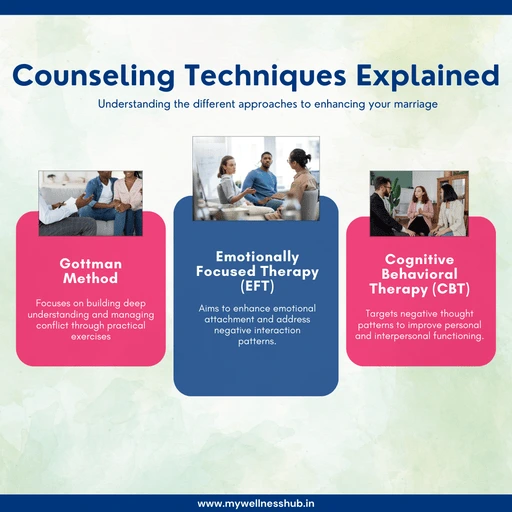
Several specific counseling techniques are particularly effective in marital therapy:
- The Gottman Method: This approach focuses on building love maps, sharing fondness and admiration, and turning towards instead of away from each other. It emphasizes managing conflict rather than resolving it, recognizing that some issues are perpetual.
- Emotionally Focused Therapy (EFT): EFT is based on the premise that emotional responses shape both the harmony and discord in relationships. It works by helping couples understand and reorganize their emotional responses so that they can better meet each other’s needs.
- Cognitive Behavioral Therapy (CBT): CBT helps couples identify and challenge the negative thought patterns that often lead to conflicts. By changing these patterns, couples can alter their behaviors and interactions in a positive way.
Conclusion
Recognizing when to seek help for your marriage is crucial. Taking action early can prevent bigger problems and help maintain a healthy relationship. Seeking help shows strength and commitment to each other, not weakness. It means you’re both willing to improve and grow together.
At Wellness Hub, we’re here to support you. If you’ve noticed any issues we discussed, consider how marriage counseling could help. Visit our website for more resources and guidance. Taking this step can strengthen your bond and bring more joy and satisfaction to your marriage.
Frequently Asked Questions:
1. What is marriage counseling and how can it help my relationship?
Marriage counseling is a form of therapy that can help couples improve their communication, resolve conflict, and strengthen their relationship. It can be a helpful tool for couples at any stage of their relationship, from those who are just starting out to those who have been together for many years.
2. What are some signs that my marriage might benefit from counseling?
There are many signs that your marriage might benefit from counseling, including:
- Frequent arguments or conflict
- Difficulty communicating with each other
- Feeling disconnected or indifferent towards your partner
- A lack of intimacy
- Infidelity or trust issues
- Major life changes, such as job loss, a new baby, or moving to a new city
3. What happens in marriage counseling?
In marriage counseling, you will meet with a therapist who will help you and your partner identify the issues that are affecting your relationship. The therapist will then teach you communication skills and conflict resolution strategies that you can use to improve your relationship.
4. What are some different types of marriage counseling?
There are many different types of marriage counseling, but some of the most common approaches include:
- The Gottman Method
- Emotionally Focused Therapy (EFT)
- Cognitive Behavioral Therapy (CBT)
5. How do I know if I should seek out marriage counseling?
If you are considering marriage counseling, it is important to talk to your partner about it. You can also call a therapist or mental health professional to get more information about what to expect in counseling.
6. Is marriage counseling a sign that my marriage is failing?
No. Seeking marriage counseling is a sign that you are committed to improving your relationship. It is a proactive step that can help you and your partner build a stronger, healthier relationship.
7. Can marriage counseling really save my marriage?
Marriage counseling can be a very effective tool for improving relationships. However, it is important to be realistic about your expectations. Counseling cannot fix a relationship on its own, but it can give you and your partner the tools you need to do the work.
8. What if my partner is resistant to going to counseling?
Open and honest communication is key. Explain your concerns and the potential benefits of counseling. Suggest a free consultation or introductory session to see if it feels like a good fit.
9. Is marriage counseling confidential?
Yes, marriage counseling is generally confidential. However, there are some exceptions, such as if there is a risk of harm to yourself, your partner, or a child. Discuss confidentiality with your therapist during the initial session.
10. What can I expect to achieve through marriage counseling?
Marriage counseling can help you and your partner develop better communication skills, learn healthy conflict resolution strategies, rebuild trust, and increase intimacy. You can also expect to gain a deeper understanding of each other’s needs and perspectives.
About the Author:
Prapoorna Mangalampalli
M.Sc., M.A., (Dual Masters in Psychology & English) – Counselor (6+ years of experience)
Prapoorna armed with a passionate dedication fueled by dual Master’s degrees in Psychology and English, Prapoorna sheds light on and elevates human experiences. Over 6+ years of experience fuel her insightful approach to counseling, offering profound empathy and guidance across diverse areas like online, marital, relationship, child, family, and career counseling.
At Wellness Hub, she thrives in a team environment that values innovation, compassion, and achieving results for their clients.
Connect with Prapoorna to learn how she can help you or your loved one find their voice and build a brighter future.
Book your Free Consultation Today
Parent/Caregiver Info:
Client’s Details:
* Error Message

